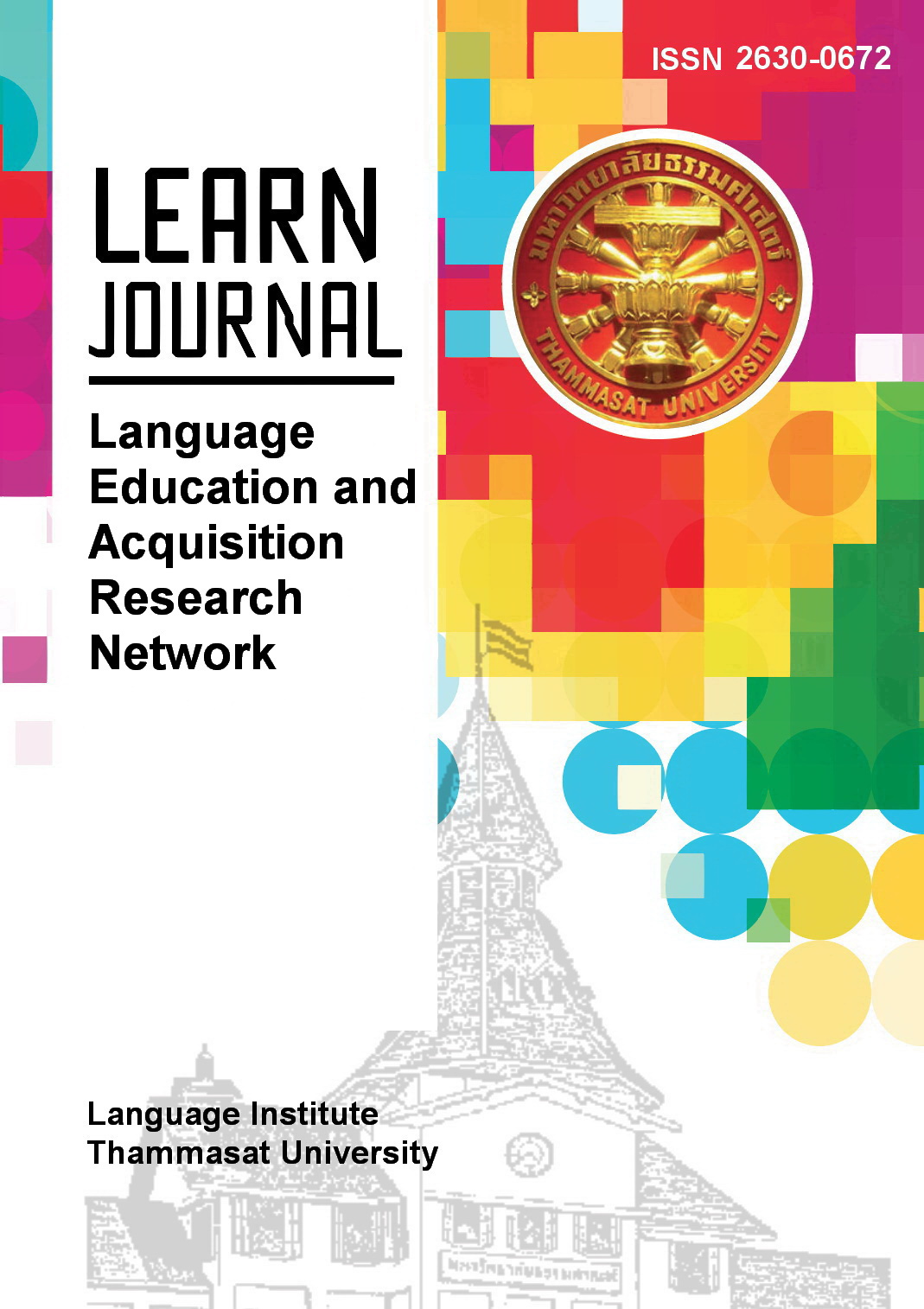The Representation of the New Generation of Thai Pro-Democracy Activists in Online English-Language News Articles
Main Article Content
Abstract
The current study concerns the new wave of pro-democracy activism in Thailand as an international political phenomenon in online news discourse. The investigation employs a critical discourse analysis approach to examine discourse strategies adopted to construct the representation of Thai pro-democracy activists and decode the underlying ideology hidden in the news articles reporting this controversial movement. Thirty English-language news articles reporting on the same incidents and published between October 2020 and March 2022 were downloaded from the Bangkok Post and Reuters websites and analyzed using the Ideological Square framework (van Dijk, 2000, 2006, 2011, 2013). Scrutiny was given to the use of lexicon, granularity, local coherence, superstructures, and syntactic structures as discourse features. The findings indicate that discourse strategies are ideologically used on the Bangkok Post website to construct a negative other-presentation of Thai pro-democracy activists. Such strategies are deliberately adopted on the Reuters website to fabricate a positive self-presentation of the activists. The study contributes to knowledge of how language is used to generate narratives and shape audience perceptions by shedding light on the ideological implications hidden in the discourse strategies employed by news sources.
Article Details
References
Annan, K. (2020). Democracy: Manual for human rights education with young people. Council of Europe. https://www.coe.int/en/web/compass/democracy#:~:text=The%20word%20democracy%20comes%20from,the%20will%20of%20the%20people.
Aungsuwan, W. (2017). A corpus-informed appraisal analysis of Thai media representation and attitudes towards red-shirt protesters in political conflicts in Thailand. https://doi.org/10.2139/ssrn.2980632
Digital news report (2021). Reuters Institute. Retrieved March 1, 2023, from https://reutersinstitute.politics.ox.ac.uk/digital-news-report/2021
Fairclough, N., Mulderrig, J., & Wodak, R. (2011). Critical discourse
analysis. In T. A. van Dijk (Eds.), Discourse studies: A multidisciplinary introduction (pp. 357-378). SAGE Publications Ltd. https://doi.org/10.4135/9781446289068
Fowler, R. (1991). Language in the news: Discourse and ideology in the press. Routledge.
Hall, S. (2013). The work of representation. In S. Hall, J. Evans, & S.
Nixon (Eds.), Representation: Cultural representations and signifying practices. Sage.
Hewison, K. (2020). Look right: The conservative elites opposing Thailand’s protesters. Melbourne Asia Review, 4. https://doi.org/10.37839/mar2652-550x4.10
Melendez. (2020, October 25). #WhatsHappeningInThailand: Government crackdown on the right to protest. Article 19. https://www.article19.org/resources/whatshappeninginthailand-government-crackdown-on-the-right-to-protest/
Phoborisut, P. (2020). The 2020 student uprising in Thailand: A dynamic network of dissent. ISEAS Perspective, 129. https://www.iseas.edu.sg/articles-commentaries/iseas-perspective/2021-94-feminism-and-the-pro-democracy-cause-in-thailand-by-wichuta-teeratanabodee/
Teeratanabodee, W. (2021). Feminism and the pro-democracy cause in Thailand. ISEAS Perspective, 94. https://www.iseas.edu.sg/articles-commentaries/iseas-perspective/2021-94-feminism-and-the-pro-democracy-cause-in-thailand-by-wichuta-teeratanabodee/
The trust principles. (2019). Thomson Reuters. Retrieved March 1, 2023, from https://www.thomsonreuters.com/en/about-us/trust-principles.html#:~:text=The%20Thomson%20Reuters%20Trust%20Principles,fundamental%20to%20our%20entire%20business.
Thomas, E., Beattie, T., & Zhang, A. (2020). #WhatsHappeningInThailand: The power dynamics of Thailand’s digital activism. Australian Strategic Policy Institute. http://www.jstor.org/stable/resrep27718
Traijakvanich, N., & Rojjanaprapayon, R. (2020). Ideologies in Thai politics. Journal of Suvarnabhumi Institute of Technology (Humanities and Social Sciences), 6(2), 415–428. https://so04.tci-thaijo.org/index.php/svittj/article/view/241211
van Dijk, T. A. (2000). Ideology: A multidisciplinary approach. SAGE Publications Ltd, https://dx.doi.org/10.4135/9781446217856
van Dijk, T. A. (2006). Ideology and discourse analysis. Journal of Political Ideologies, 11(2),
-140. https://doi.org/10.1080/13569310600687908
van Dijk, T. A. (2008). News, discourse, and ideology. In K. Wahl-
Jorgensen & T. Hanitzsch (Eds.), The handbook of journalism studies. Routledge. https://doi.org/10.4324/9780203877685
van Dijk, T. A. (2011). Discourse studies: A multidisciplinary introduction. SAGE Publications Ltd. https://dx.doi.org/10.4135/9781446289068
van Dijk, T. A. (2013). Ideology and discourse. In M. Freeden & M.
Stears (Eds.), The Oxford handbook of political ideologies (pp.175-
. Oxford Academic. https://doi.org/10.1093/oxfordhb/9780199585977.013.007
Viboonchart, N., & Gampper, C. (2014). The underlying ideologies
in news articles: The study through the use of direct quotations and lexical choices in an English newspaper in Thailand and an American newspaper. Asian Social Science, 10(15). https://doi.org/10.5539/ass.v10n15p187
Vision & mission. (2019). Bangkok Post. Retrieved March 1, 2023, from https://www.bangkokpost.co.th/business/newspaper/bangkokpost
Wodak, R., & Meyer, M. (2009). Critical discourse analysis: History, agenda, theory, and methodology. In R. Wodak, & M. Meyer (Eds.) Methods of critical discourse analysis (pp.1-33). SAGE.


